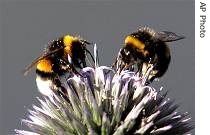-
(单词翻译:双击或拖选)
By Jessica Berman
Washington
26 October 2006
An international consortium of scientists has completed work on deciphering the genome of the honey bee. They hope the work will lead to a better understanding of one of the earth's most social and ecologically important creatures.
-------
 |
||
Through pollination1, honey bees are also an essential part of global food production.
"This is the first genome sequenced of a social insect to be presented and analyzed," said Gene2 Robinson. "Social insects have been extremely important in biology because they exhibit the most extreme form of social behavior that's known."
Gene Robinson is one of the lead authors of the paper describing the honey-bee genome sequence project published in the journal Nature.
In an interview with the editors of Nature, Robinson, who is with the University of Illinois in Urbana, says there are a number of reasons why it is important to understand the molecular3 structure of the honey bee, which appears to have transformed over millions of years to a highly evolved creature.
Humans, too, are highly evolved, and scientists believe clues about bee behavior might explain human traits.
For example, researchers say both bees and humans have genes4 that encode a circadian rhythm - an innate5 sense of day and night. In the case of bees, the scientists think this makes honey bees more efficient at gathering6 food.
Robinson says the bees have more genes that encode the sense of smell than other insects.
"A lot of their social life is coordinated7 by odors, in particular by pheromones," he said. "The way they collect food, forage8 for food out in the field, find flowers, is by odor of the flowers."
Scientists say pheromones secreted9 by bees also determine their place within a complicated social order, including gender10, age and caste.
Robinson also says honey bees have fewer genes for taste than other insects, which, he speculates, helps them to avoid pesticides11 and plant diseases to find food.
"Traits have evolved to attract them [bees] to the plant to effect pollination," he explained. "So, you know, maybe they do not have to be so worried about their tasting. Now this is extending the findings a good deal into the realm of speculation12. But this is the kind of filter that we wish to use in the future to sort of take the initial findings that we present here and explore exactly how they relate to bee life."
In a paper published at the same time in the journal Science, researchers analyzing13 the honey bee genome report every bee alive today had a common ancestor in Africa. Researchers say the bees spread to Europe in at least two ancient migrations14.
Also in Science, researchers describe the world's oldest bee fossil.
Entomologist Brian Danforth, of Cornell University in New York says the fossil was found in a piece of Burmese amber15 believed to be 100 million years old, which would have made it an ancient ancestor of today's honey bee.
"It is a very small bee," he said. "It is about three millimeters long. It does have some of the attributes of modern bees, and some of those attributes are visible in the fossil. So, it has what looks like branched hairs; these are the fluffy16 hairs that bees have on their legs and all over their bodies actually, that seem to be very good at picking up pollen17."
But unlike evolved modern honey bees, Danforth thinks the ancient bee was a solitary18 creature that lived in the ground.
 收听单词发音
收听单词发音
1
pollination

|
|
| n.授粉 | |
参考例句: |
|
|
|
2
gene

|
|
| n.遗传因子,基因 | |
参考例句: |
|
|
|
3
molecular

|
|
| adj.分子的;克分子的 | |
参考例句: |
|
|
|
4
genes

|
|
| n.基因( gene的名词复数 ) | |
参考例句: |
|
|
|
5
innate

|
|
| adj.天生的,固有的,天赋的 | |
参考例句: |
|
|
|
6
gathering

|
|
| n.集会,聚会,聚集 | |
参考例句: |
|
|
|
7
coordinated

|
|
| adj.协调的 | |
参考例句: |
|
|
|
8
forage

|
|
| n.(牛马的)饲料,粮草;v.搜寻,翻寻 | |
参考例句: |
|
|
|
9
secreted

|
|
| v.(尤指动物或植物器官)分泌( secrete的过去式和过去分词 );隐匿,隐藏 | |
参考例句: |
|
|
|
10
gender

|
|
| n.(生理上的)性,(名词、代词等的)性 | |
参考例句: |
|
|
|
11
pesticides

|
|
| n.杀虫剂( pesticide的名词复数 );除害药物 | |
参考例句: |
|
|
|
12
speculation

|
|
| n.思索,沉思;猜测;投机 | |
参考例句: |
|
|
|
13
analyzing

|
|
| v.分析;分析( analyze的现在分词 );分解;解释;对…进行心理分析n.分析 | |
参考例句: |
|
|
|
14
migrations

|
|
| n.迁移,移居( migration的名词复数 ) | |
参考例句: |
|
|
|
15
amber

|
|
| n.琥珀;琥珀色;adj.琥珀制的 | |
参考例句: |
|
|
|
16
fluffy

|
|
| adj.有绒毛的,空洞的 | |
参考例句: |
|
|
|
17
pollen

|
|
| n.[植]花粉 | |
参考例句: |
|
|
|
18
solitary

|
|
| adj.孤独的,独立的,荒凉的;n.隐士 | |
参考例句: |
|
|
|















